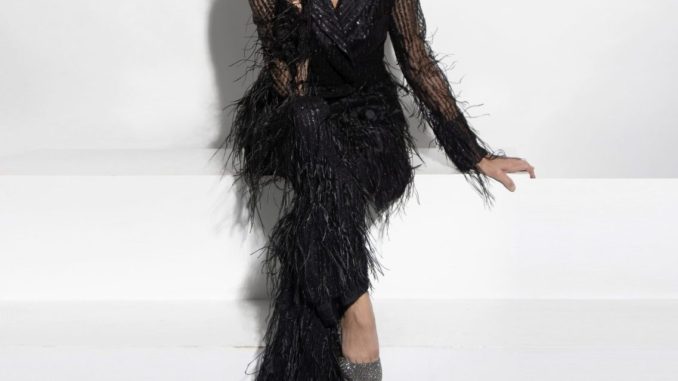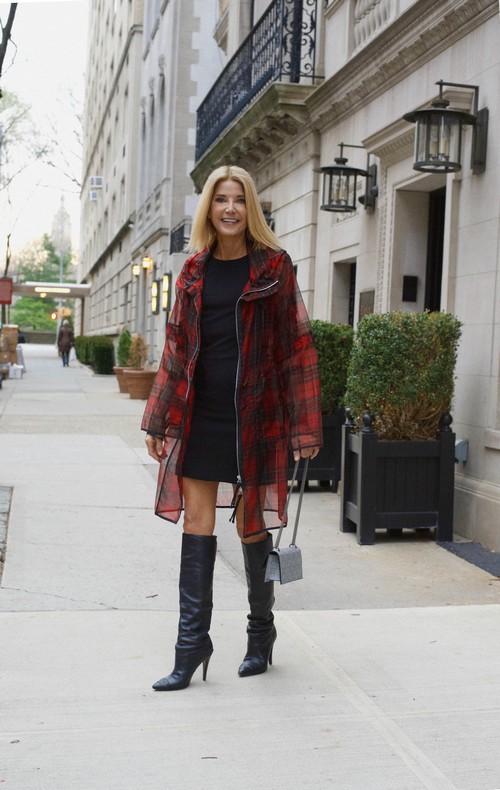
Candace Bushnell is bringing her critically acclaimed one-woman show, ‘True Tales of Sex, Success and Sex and the City,’ to Patchogue Theatre on Nov. 8.
Anna Maguire
International bestselling novelist Candace Bushnell, who has been giving voice to women’s issues for decades, is now on tour with her critically acclaimed one-woman show, True Tales of Sex, Success and Sex and the City.
Bushnell first arrived on the literary scene with her wildly popular New York Observer column Sex and the City (1994-96) which became a hit novel in 1996. The successful HBO series (1998-2004) spawned two films in 2008 and 2010. Presently, the reboot, And Just Like That … on HBO, picks up where the original series left off.
Audiences can’t get enough of these four irresistible women and their antics played out against the glorious New York City skyline. At the center is newspaper columnist Carrie Bradshaw (Sarah Jessica Parker), sexually liberated Samantha Jones (Kim Cattrall), lawyer Miranda Hobbes (Cynthia Nixon) and conservative art dealer Charlotte York (Kristin Davis). Chris Noth played Bradshaw’s love interest Mr. Big.
Sex and the City was followed up with eight bestselling novels, two of which, Lipstick Jungle and The Carrie Diaries were adapted into television series.
Bushnell takes her sizzling one-woman show to Patchogue Theatre for the Performing Arts on Friday, Nov. 8. Join her for a great night out with your friends and don’t forget to wear your Jimmy Choos.
Do you live in Sag Harbor?
Yes, but I go to the city every week for a couple of days. I did my show in the Hamptons at Canoe Place Inn and a charity benefit at The Church, an art center.
What should audiences expect to see when they come to your one-woman show?
It’s my life story mixed with the origin story of Sex and the City. It’s how I wrote it, how hard I worked to get there, why I invented Carrie Bradshaw and what happened to me after. I tell stories about the real Mr. Big. Do I really have a shoe obsession like Carrie Bradshaw? I talk about my friendships with my Charlotte, Miranda and Samantha. And we play a little game called Real or Not Real. I use clips from the show and compare them to my real life, because there’s a lot that happened in the show that also happened to me, but it’s either better or worse.
The feedback that I’ve gotten about the show is that it’s inspirational because it takes you through a woman’s life from first moving to New York, when I was a teenager, to present day, then coming back to dating again and some of the types of men we now encounter.
Why did you pursue a literary and not an acting career early on?
I had some TV work when I was younger. Because of my column, I had my own reality TV show in the mid-90s called Sex, Lies and Video Clips on VH1. It was kind of racy. We explored polyamorous people, Colorado, and a dominatrix dungeon. But I love writing novels.
Which is easier, writing or acting?
Acting on a stage is probably a little easier because it’s set and I don’t have to come up with something new every day. With writing, is it gonna be a good day or a bad day? I’ve gotta come up with something new and create this thing. With acting in this show, it’s already created.
How were you able to parlay the New York Observer column into the novel and then the TV series?
Hollywood came to me. HBO wanted to buy the column. The column was the big hit. People would rush to the newsstands Wednesday morning to get their copies and they started faxing it to their friends in LA who worked in the entertainment business. HBO, ABC and others were interested. I sold the rights to Darren Star because he was a friend of mine. He worked in TV and was doing a CBS show at that time called Central Park West.
You have said that the man you modeled Mr. Big after broke up with you just as your career took off. Have you been in touch with him since?
Yes, we’re friends. He lives in Vermont. He’s been married for 25 years and has a child who I think graduated from college. Life goes on. His story did not follow the story of Mr. Big and the TV series. It’s similar for a while, then the TV show goes in its own direction.
Do you feel a responsibility knowing that you are an influence on women and their choices?
Yes, I’m a big proponent of what they call decentering, men and women becoming their own Mr. Big. That’s something that I’ve been encouraging women to do for at least a couple of decades. Now it’s clicking with a lot of women. For the first time I see on social media there are women who aren’t drinking that ‘a man, marriage and children will make you happy’ Kool-Aid. I think women are saying, you know what, these heterosexual relationships are not working for me. The power and balance do not work. Although most women are mothers, I do see things that I’ve never seen before, like a site where a woman collects stories of people who regret having children.
That’s something our society never would have allowed before and I think it’s wonderful that women can speak the truth about their experiences saying I wish I didn’t have kids. It’s something that was not accepted by society even five years ago. It’s women taking an honest look at their lives and seeing what works for them and what doesn’t. I think it’s fantastic because it really is about having choices.
Not every woman has to live the same life. Every woman who has children is living the same life. They’re taking care of those kids. Society tells us that’s the only way you’re going to have value in your life. They get stuck, they’re kind of forced into that situation. We should accept all kinds of situations for women.
Do you find it challenging to write about women of a certain age?
I don’t find it challenging, but what is challenging is there isn’t a lot of interest in people buying stories about women of a certain age like over 50, 60 or post-menopausal. Most people who work in TV and Hollywood are either men who’ve been doing it forever and have certain obviously male-oriented shows that they do or it’s women in their 20s, 30s, maybe 40s. I’ve had Zoom meetings where I’ve said, is there anybody over 40 on this Zoom?
That’s the way the business is. It’s not any different than it always was. But there’s an increasing demographic of women over 50, 60 and 70 and they still watch TV. Advertising and fashion are the same way. Yes, there’s a lot of diversity, but little age diversity.
Is there anything that you wish you had done differently?
I wish I had made a lot more money in my 20s instead of being a starving writer hoping I was going to make it one day. I did, but I wish I had spent more time on my career and less time on men in my 20s. So that would be my advice to everyone.

See also: Country-Pop Royalty Elle King Gives Exclusive Interview Before Thursday’s Show

